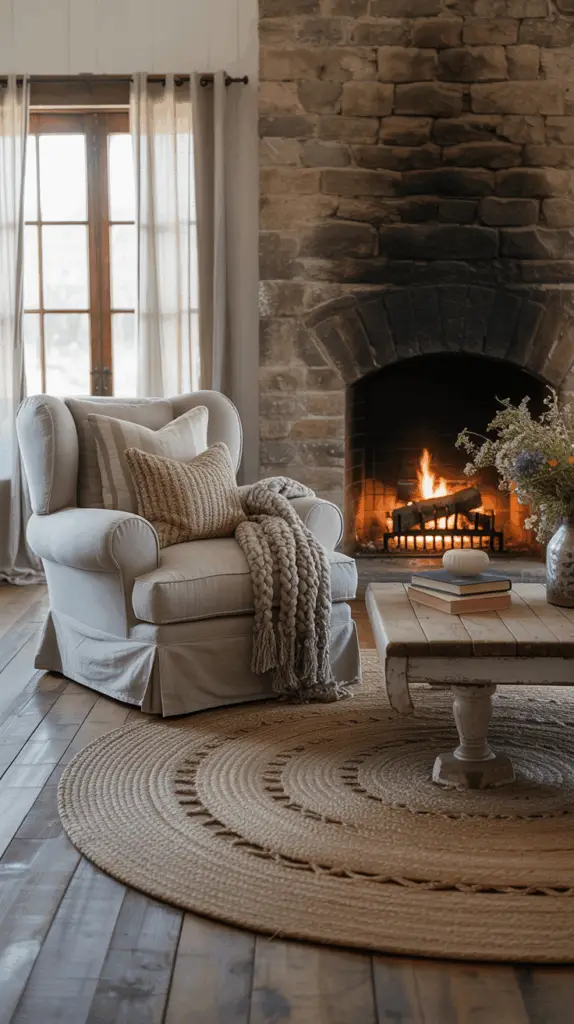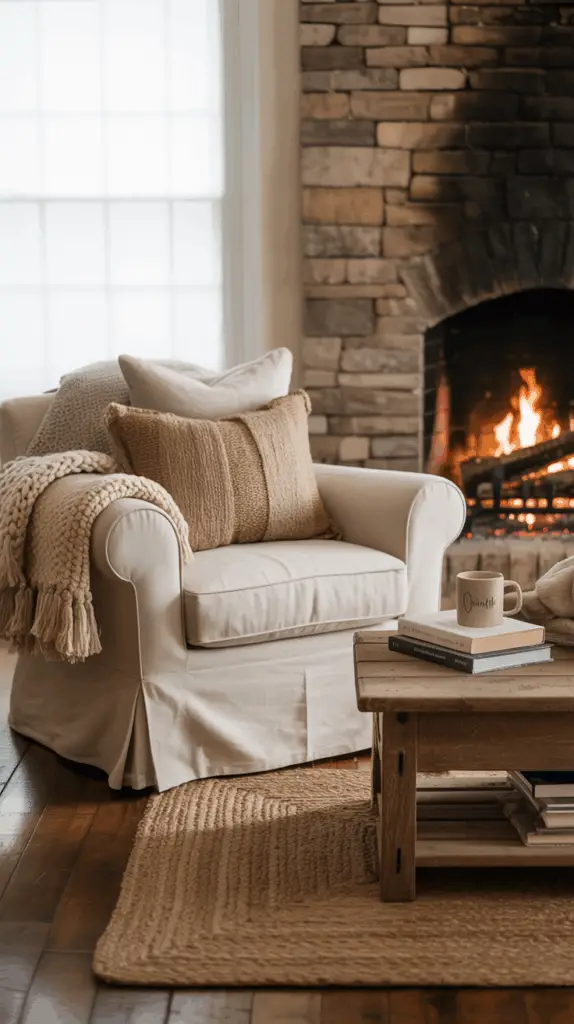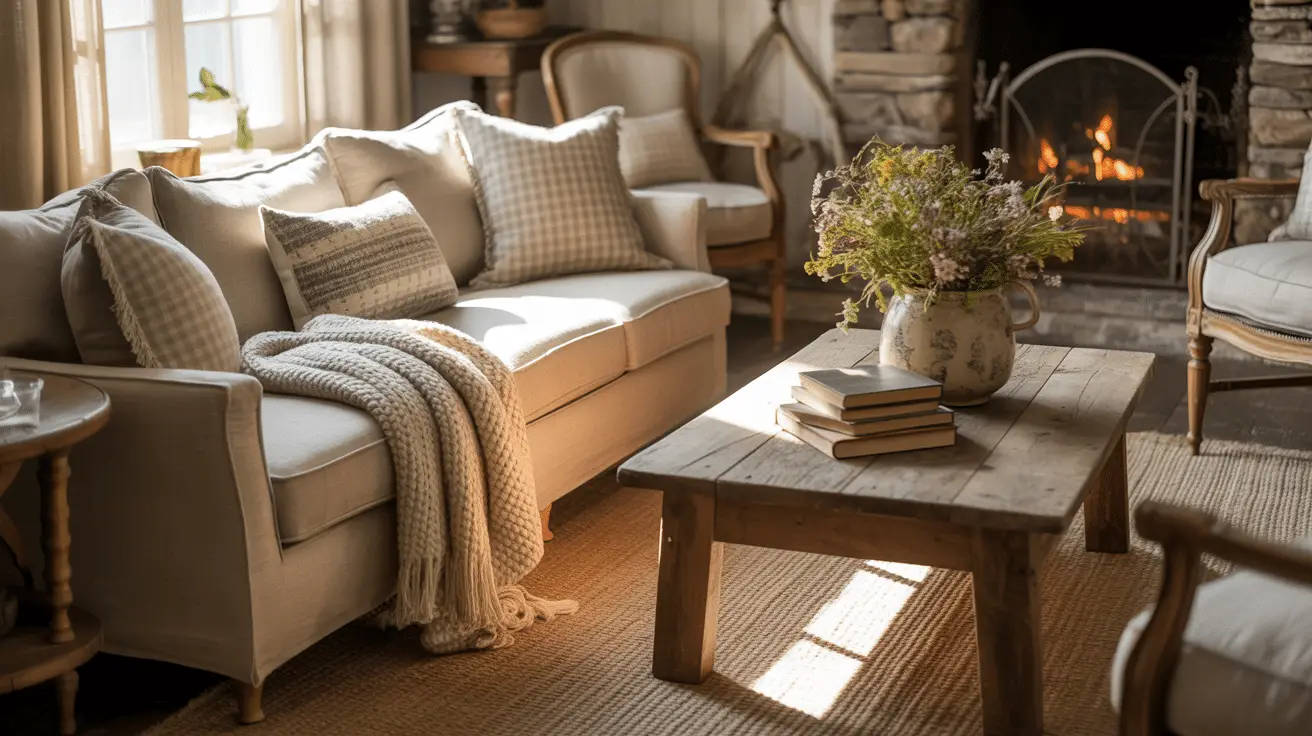How to Style a Cozy Farmhouse Living Room for Maximum Comfort: Warm and Inviting Design Tips
Table of Contents
Introduction
The living room is often the heart of the home—a place where families gather, guests feel welcomed, and quiet evenings unfold. But creating a space that is both cozy and stylish can be a challenge. Studies show that people spend over 40% of their leisure time in the living room, which means this space should offer more than visual appeal; it should embody warmth, comfort, and functionality.
For homeowners drawn to the farmhouse aesthetic, achieving this balance is especially important. Farmhouse style thrives on rustic charm and timeless details, yet it must also feel inviting enough for everyday living. A well-styled farmhouse living room can seamlessly blend old-world character with modern comfort, giving you a retreat that feels like home the moment you walk in.
In this article, we’ll explore practical and inspiring ways to design a cozy farmhouse living room. From choosing the right furniture and color palette to layering textures and styling décor, you’ll discover step-by-step strategies to create a living space that balances comfort and charm. By the end, you’ll have not only design inspiration but also actionable tips to transform your farmhouse living room into a cozy sanctuary.
Choosing the Right Furniture for a Farmhouse Living Room
The foundation of a cozy farmhouse living room starts with furniture selection. Farmhouse pieces often feature simple lines, distressed finishes, and a blend of rustic and contemporary styles. But while aesthetics matter, comfort is key—after all, this is where you’ll relax, read, or entertain.
Begin with the sofa. Oversized, plush couches in neutral fabrics like linen or cotton create an inviting centerpiece. Pair it with armchairs in natural materials such as leather or slipcovered upholstery for durability and softness. Coffee tables made of reclaimed wood or wrought iron reinforce farmhouse character while offering functional space for books, trays, or family game nights.
Consider scale as well. Large farmhouse spaces benefit from statement furniture, but smaller living rooms should lean on multifunctional pieces like ottomans with storage. The goal is balance—furniture should fill the room comfortably without overwhelming it.
Furniture Style Breakdown
| Furniture Piece | Farmhouse Style Option | Comfort Factor |
| Sofa | Oversized linen or cotton slipcover | Deep cushions, washable covers |
| Coffee Table | Reclaimed wood or iron base | Large surface for multipurpose use |
| Armchair | Leather or slipcovered | Cozy yet durable |
| Accent Table | Distressed wood or painted finish | Adds character without clutter |
Layering Textures for Warmth and Comfort
Texture is one of the most powerful tools in farmhouse design, adding depth and warmth to the living room. Without it, even the most thoughtfully decorated space can feel flat.
Start with textiles. Throw blankets, knit pillows, and soft area rugs instantly add coziness. Mix materials like wool, cotton, and burlap for a layered, tactile feel. Rugs are especially important; a jute or braided rug can anchor the room while offering natural warmth underfoot.
Hard textures also play a role. Exposed wooden beams, shiplap walls, and stone fireplaces bring authentic farmhouse charm. Pairing rough textures with soft ones creates harmony—for instance, a chunky knit blanket draped over a leather chair or a rustic coffee table topped with a linen runner.
Lighting enhances texture too. Lamps with woven shades or wrought-iron bases diffuse a warm glow, highlighting the layered elements in the room.
Texture Layering Guide
| Element | Example | Effect |
| Rug | Jute or braided cotton | Anchors the room with natural warmth |
| Pillows | Linen, velvet, or knits | Adds softness and visual contrast |
| Blankets | Wool or chunky knit | Enhances coziness and warmth |
| Hard Surfaces | Stone fireplace or shiplap wall | Provides rustic farmhouse character |

Crafting a Farmhouse Color Palette that Invites Relaxation
Color plays an essential role in shaping the mood of your farmhouse living room. The farmhouse palette is rooted in simplicity and calm, often built around soft neutrals and earthy tones.
Start with a base of whites, creams, or soft grays for walls. These shades reflect natural light, making the room feel airy yet grounded. Accent colors like sage green, muted blues, or warm beige add subtle personality without overpowering the space. Natural wood tones—whether in flooring, beams, or furniture—complement the palette beautifully.
Balance is crucial. Too much white can feel sterile, while overusing dark hues can weigh the space down. Layer color thoughtfully through textiles, wall art, or painted accent furniture. For example, a distressed blue sideboard or sage-green throw pillows can tie the palette together.
Farmhouse Color Palette Examples
| Color Category | Suggested Shades | Effect in the Room |
| Base | White, cream, soft gray | Creates light and openness |
| Accents | Sage green, muted blue | Adds calming contrast |
| Neutrals | Warm beige, tan | Provides balance and warmth |
| Natural Tones | Oak, pine, walnut | Grounds the space with rustic charm |

The Role of Lighting in Creating Cozy Ambience
Lighting is one of the most underestimated elements in a farmhouse living room. Beyond practicality, it sets the tone for comfort and charm. Farmhouse style thrives on layered lighting—a mix of overhead, task, and accent lighting to create warmth.
Overhead fixtures like wrought-iron chandeliers or lantern-inspired pendants establish character while distributing light evenly. Table lamps with linen or burlap shades provide softer pools of light for reading nooks or sofa sides. Wall sconces with rustic finishes add charm while saving space in smaller rooms.
Candlelight and fireplaces enhance ambience naturally. A cluster of candles in varying heights on the coffee table or mantle infuses a soft glow, while string lights woven across beams can create a magical touch.
Lighting Layer Breakdown
| Lighting Type | Example | Purpose |
| Overhead | Lantern chandelier | General illumination, farmhouse character |
| Task | Linen-shaded lamp | Focused light for reading or working |
| Accent | Rustic sconces, candles | Creates warmth and charm |
| Decorative | String lights | Adds whimsy and coziness |
Accessorizing with Farmhouse Charm Without Clutter
Accessories breathe personality into the farmhouse living room but should never feel overwhelming. The key is choosing pieces with meaning and character rather than filling every surface.
Wall décor like vintage signs, botanical prints, or distressed mirrors can add farmhouse flair. Open shelving with curated displays of pottery, woven baskets, or antique finds enhances rustic charm. Layering smaller décor items—like trays with candles, mason jars, or books—creates vignettes that feel personal and intentional.
Seasonal accessories are another way to refresh the room without major overhauls. Swap in plaid blankets for fall, greenery for spring, or natural wreaths for winter to keep the space cozy year-round.
Accessory Checklist for Farmhouse Living Rooms
| Accessory Type | Farmhouse Style Example | Purpose |
| Wall Art | Vintage signs or botanical prints | Adds rustic personality |
| Storage | Woven baskets | Functional and decorative |
| Table Décor | Mason jars, trays, candles | Creates inviting vignettes |
| Seasonal Touches | Plaid blankets, greenery | Keeps the space fresh |
Blending Old and New for Timeless Farmhouse Appeal
One of the joys of farmhouse design is the freedom to mix vintage treasures with modern comforts. This balance prevents the space from feeling like a museum while maintaining authentic character.
Antiques or thrifted items—like weathered trunks or farmhouse benches—pair beautifully with modern sofas or sleek lighting fixtures. The contrast creates a layered look that feels lived-in yet curated. For example, a reclaimed wood coffee table under a modern glass lamp balances rustic and contemporary elements effortlessly.
Sustainability is another bonus of blending old and new. Repurposed furniture not only adds charm but also reduces waste. Incorporating heirlooms or DIY projects also makes the space uniquely yours.
Old + New Style Guide
| Old Element | New Element | Effect |
| Distressed trunk | Modern sofa | Adds history to sleek comfort |
| Antique bench | Minimalist shelving | Balances rustic with clean lines |
| Reclaimed wood coffee table | Glass lamp | Mixes warmth with modern elegance |
| Vintage artwork | Fresh textiles | Keeps character without heaviness |
Conclusion
A cozy farmhouse living room isn’t about perfection—it’s about balance. By choosing comfortable, rustic furniture, layering textures, embracing soft colors, and thoughtfully accessorizing, you can create a space that feels warm, timeless, and deeply inviting. Lighting and the art of blending old with new ensure the room never feels staged but instead becomes a true reflection of lived-in charm.
Whether you’re starting from scratch or refreshing your current design, these ideas can guide you toward a farmhouse living room that delivers maximum comfort and beauty. It’s about creating a place where every detail tells a story and every moment feels at home.

